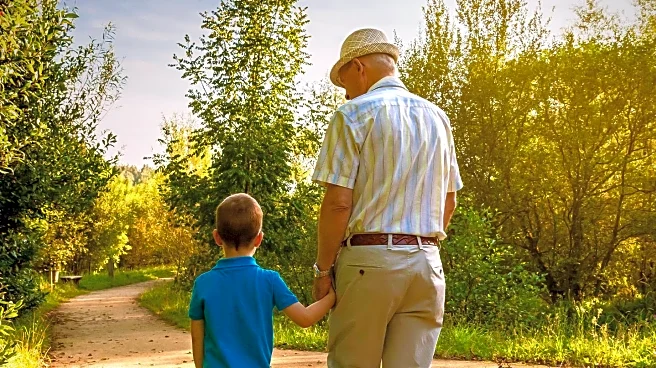What's Happening?
Recent demographic research highlights a trend of grandparents becoming older on average, which is reshaping family structures and caregiving dynamics. Kathy L., a mother in North Carolina, exemplifies this shift as she balances caring for her children and her husband's elderly aunt with dementia. This situation is increasingly common as families face the dual responsibilities of child and elder care, often referred to as the 'sandwich generation.' The Max Planck Institute for Demographic Research has projected that family networks will shrink, with fewer biological relatives due to delayed childbearing and declining fertility rates. This trend results in families becoming more vertical, with fewer siblings and cousins but more generations living simultaneously.
Why It's Important?
The aging population and smaller family networks have significant implications for caregiving responsibilities and societal structures. As grandparents become older, they are more likely to require care themselves, increasing the burden on middle generations. This shift may lead to greater reliance on public and private institutions for elder care, necessitating substantial financial investments. Additionally, the caregiving role often falls to women, impacting their workforce participation and financial security. The demographic changes challenge existing systems and highlight the need for comprehensive long-term care solutions, particularly for older adults.
What's Next?
As the population continues to age, families and policymakers must address the growing need for elder care and support systems. The potential increase in demand for institutional care could strain existing resources, prompting discussions on restructuring pension schemes and retirement age policies. The demographic shift may also influence cultural perceptions of family roles and caregiving, encouraging more inclusive and supportive community networks. Policymakers and social institutions will need to adapt to these changes to ensure sustainable care solutions for future generations.
Beyond the Headlines
The evolving family dynamics could lead to deeper cultural shifts, as younger generations witness the complexities of caregiving and familial responsibility. This experience may foster empathy and understanding, influencing societal values around family support and intergenerational relationships. Additionally, the demographic trends could impact economic policies, as governments and businesses consider the implications of a shrinking workforce and increased caregiving demands.











